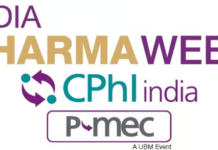New Delhi, September 19, 2016
Q 1: Tell us about your journey from a Pharmacist to a successful entrepreneur in the Pharma sector.
After obtaining a degree in Pharmacy from Kerala University in 1975, I had the opportunity to move to the United States and work as a pharmacist. I eventually pursued my passion for knowledge and did a Masters in Industrial Pharmacy from Long Island University, New York. I obtained the opportunity to work for top pharmaceutical companies, like, Pfizer Inc., Carter Wallace and Paco Research while pursuing my doctorate from St. John’s University.
I always wanted to introduce Indian Ayurveda to Americans as a therapeutic adjuvant for various ailments, and hence started Sabinsa Corporation in 1988 in the state of New Jersey, USA, where we marketed more than 30 standardized botanical extracts back then, most of which were derived from Indian herbs and cited in the Ayurveda. Witnessing a growing demand for our products, we established Sami Labs in Bangalore in 1991 that houses a large research and development facility today. The objective was to develop nutraceuticals and fine chemicals for various marketing organizations. Eventually Sabinsa around the world became the business to business marketing arm of Sami Labs. In 2010, we started Sami Direct, which is the direct marketing entity of finished nutraceutical and cosmeceutical products from Sami Labs.
Today Sami Labs has emerged as a globally known brand with more than 115 international patents and string of alliances in the US, Japan, Korea, Europe, Australia, Middle East, South Africa, China, etc.
It was my dream and vision that the goodness of plants reaches every household and that health and wellness be affordable for all. Today, with Sami Direct, this dream is slowly turning into reality.
Q 2: Why do think Ayurveda should be promoted worldwide?
Ayurveda is a comprehensive traditional and natural health care system that originated in India more than 5,000 years ago. It is still widely used in India as a system of primary health care, with interest in it growing worldwide as well. Though a lot of modern allopathic treatments are available for curbing diseases, they only address the symptom without deeply addressing the cause. Unfortunately, there are a significant number of side effects that are disadvantageous, with no long-term solution. Moreover, there are some of the ailments that allopathic medicine fails to address. This has led to growing interest and acceptance of Ayurvedic medicine whose principle lies in eradicating the root of the health issue and cleansing the system with lesser side effects on the individual. The term Ayurveda stands for the ‘science of life’ and it helps in healing the body with natural herbs, while also healing the mind. The recent decade has witnessed many landmark observations, which have added to the scientific credentials of Ayurveda. It is widely recognized for their holistic approach to health and capability for meeting emerging health challenges.
Q 3: Most of the Ayurvedic herbs are becoming extinct. How do you source your raw materials?
Fortunately, India has varied agro-climatic zones across many regions that can contribute to better land use patterns and is home to over 15,000 medicinal plants, of which approximately 7,000 plus are used for Ayurveda. The most important herbs grown in India for the global market include aloe-vera, amla, ashwagandha, brahmi, curcuma, garlic, henna, neem, lemon grass, poppy, saffron, sandalwood, and tulsi. The challenges, however are ancient methods of commercial farming, collecting, processing, storing and marketing of medicinal herbs are still being practiced. The country continues to rely on very fundamental and unsophisticated technology to a large extent. The solution lies in encouraging sustainable harvesting of plants through cultivation that provides a holistic approach. This new method should involve integrated nutrient and pest management contributing to soil health, resulting in high quality produce besides positively contributing to the society in the long run. However, we have expressed our concerns to the Government about preserving Ayurvedic plants, out of 460 plants used in Ayurveda, 400 are in the endangered list. We need an Herbal Security Bill, like the Food Security Bill to pursue this system of medicine in times to come.
Q 4: How many researchers are working in Sami Labs at present? What kind of research they are into?
Research is a broader term and can be classified into three- research, basic research and applied research. Unfortunately Indian companies focus on applied research- the practical application of research found by someone. But then the need of the hour is basic research which Americans give more importance. Foreseeing huge potential in the healthcare sector across the globe, we continue to draw from our R&D strength, following the track record of launching innovative nutraceutical & cosmeceutical products that are successful across the globe in the coming years. R&D investment alone is in the range of 6-7% of the annual turnover year after year. Because it is the basic belief that the products that will make money for me 20 years down the line is an idea today. Unless I put this idea into practice, I wouldn’t be able to make the product. Whereas other corporate institutions put less than 10% of space for research, Sami Lab’s almost entire facility is dedicated to research. The number of patented products to Sami Labs/ Sabinsa Group is the proof that the research here brings result. At present we have 115 International patents to our credit and another 75 pending.
Sami Labs was honored with the NIB Global Innovation & Excellence Award at a ceremony organized by the Public Relations Council of India (PRCI) and the Press Club of India for the annual title, 2016. The award was largely in recognition of the Intellectual Property portfolio attained by the Sami-Sabinsa Group, now encompassing over 115 US & international patents. Unlike other organizations in the space, Sami Labs of which Sami Direct is the subsidiary, houses a research facility with over 200 scientists involved in specialized work in areas of phytochemistry, organic chemistry, tissue culture, plant biotechnology, biochemical pharmacology and clinical research.
The recent patents are comprised of ingredients such as Calebinoids; stilbenoids; peptides; 3-hydroxypterostilbene; boswellic acids; and garcinol along with several others in countries ranging from China and New Zealand to the US, Canada and Mexico. The categories ranged from hypercholesterolemia, weight management, treating skin aging, inhibiting and preventing adipogenesis, protecting articular cartilage and even a hepatoprotectant molecule. Many of these will find a place in Sami-Sabinsa’s Nutraceutical, Cosmeceutical, Functional Food and Natural Drug divisions for commercialization and licensing.
The current R&D impetus of the Sami-Sabinsa group focuses strongly on immunological basis of disease management by natural principles. With precise scientific evidence generation at the basic, pre-clinical, and clinical research stages, the group believes in creating reliable and responsible science. This objective has been recognized by the intellectual property systems across the globe.
Sami Labs is also associated with Universities across the globe where scientists and researchers evaluate the standardized ingredients from Sami for applications they specialize in. The studies range from in vitro, in vivo to a number of clinical validations. A standing example would be the evaluation of Curcumin C3 Complex in MD Anderson Cancer Research Institute for its potential role in cancer management. These studies emphasize and further validate the role of natural ingredients in improving health and wellness. Similar studies with products from the portfolio of the Sami-Sabinsa group have been and continue to be carried out in a number of Universities and Institutes across the world.
Q 5: How do you market Sami labs product?
As ‘wellness’ started to catch-up in India among the urban population indicated by the rising number of luxury spas and retail outlets selling health supplements, we seized the large business opportunity in the country and launched a new company – Sami Direct to market his organization’s products through direct marketing and distribution network. Sami Direct now markets a range of around 20 products, covering weight management, bone strength, liver strength, detox supplements, skin and beauty care, etc. for the past 5 years across India.
Q 6: How many Sami products are available in the market? How your products are different from the other players in the market?
Sami Direct now markets a range of around 20 products, covering weight management, bone strength, liver strength, detox supplements, skin and beauty care, etc. for the past 5 years across India. Mother Nature is the biggest chemist, synthesizing a wide variety of interesting and amazing chemical moieties with potential benefits to mankind. Research laboratories at Sami Labs Limited endeavour to tap this immense natural potential to bring out products with the goal of “Design to Delivery”. To achieve this goal, several independent divisions work with a synergistic approach and help profile the product to meet international standards. The innovations have brought us not just a rising arrow in our growth chart, but also have won us several accolades and awards, national and international.
Sami Direct offers exceptional and life changing products, in the categories of nutraceutical product range such as Bioprotectant, Calci D Max and Cran DM Plusto name a few. Johara® Cosmeceuticals, the Beauty Brand of SamiDirect has hand-picked from the secrets of time-tested botanical ingredients that have evolved from pure science and scripted in many ancient texts across the world. Our skin care formulae will always be free of Parabens, Sulfate, Synthetic Dye or Formaldehyde and will always have standardized botanical extracts and be clinically relevant. One of the most researched ingredients of the group is turmeric, more specifically Curcumin. From the cultivation to the standardization, our group holds several international patents and accolades on this ingredient, branded as Curcumin C3 Complex. This brand finds a place in many of the Sami Direct products today.
Q 7: How do you help the farmers who wants to do organic farming/contract farming?
Quality being our bench mark, to get quality raw material we turned to contract cultivation of medicinal plants in the year 1999. Through contract farming we could monitor and make improvements in the medicinal herb crop right from the initial stages of processing which is the use of superior high yielding lines. We could also assure ourselves about the required quantity of material through sustainable cultivation techniques. In view of the increased demand and unchecked use, many of the medicinal plants were becoming extinct. We wanted to arrest and reverse this trend to the extent possible.
The medicinal plants grown by the company are turmeric (Curcuma longa), coleus (Coleus forskohlii), tulsi (Ocimum tenuiflorum) and gac (Momordica cochinchinensis) to name a few. Farmers are encouraged to grow particular varieties of medicinal plants with the best content of the biomarker compounds. We extract bioactives from these plants and the content of these principles in the plants are important for us. About 5000 farmers are working with Sami Labs across the country. They are being told to grow specific varieties of medicinal plants as required by us. Market trends and regular customer orders determine the quantities required. We select areas in compliance to the weather conditions as required for growing particular medicinal plants.
Farmers are interested to work with us on contract as they are offered buy back policy that assures them basic income. In addition, we insulate the farmers from price fluctuations by assuring them fixed price at which we buy their produce. If the market price of their produce is increased we increase our price to them proportionately. But if the market price falls we still give them the fixed minimum price. Experienced farmers always stay with us.
Company provides all possible farming inputs to its contract farmers for growing medicinal plants right from the land preparation stage. Money is given as in advance to the extent needed for cultivation expenses. After harvest and transfer of the produce to us payment is given to the farmers, deducting cost of inputs and advances given. Payment is made through bank cheque.
Sami Labs never sells any medicinal plants as raw material. We process all material grown by us, in-house. Contract farming is win-win situation for company as well as farmers. Sami Labs has an assurance on the quality and quantity of medicinal plants right from the start and farmers have assurance on their earnings.
As the demand of medicinal plants is increasing day by day its availability is coming down, cultivation of medicinal plants is the only alternative. Contract farming with farmers being a time tested and successful venture we will expand our efforts in this line in the coming years.
Q 8: What is your long term vision for Sami Direct?
Sami Direct is one of the fastest growing direct sellers of nutraceutical and cosmeceutical products in India. Sami Direct products are sold through 3,00,000+ Independent Business Owners in India, Malaysia, and Bangladesh. We plan to expand our market reach to Indonesia, Philippines and Dubai within the next two years. Our product portfolio will also expand to include more award-winning ingredients with the finest research.
Corporate Comm India(CCI Newswire)






















